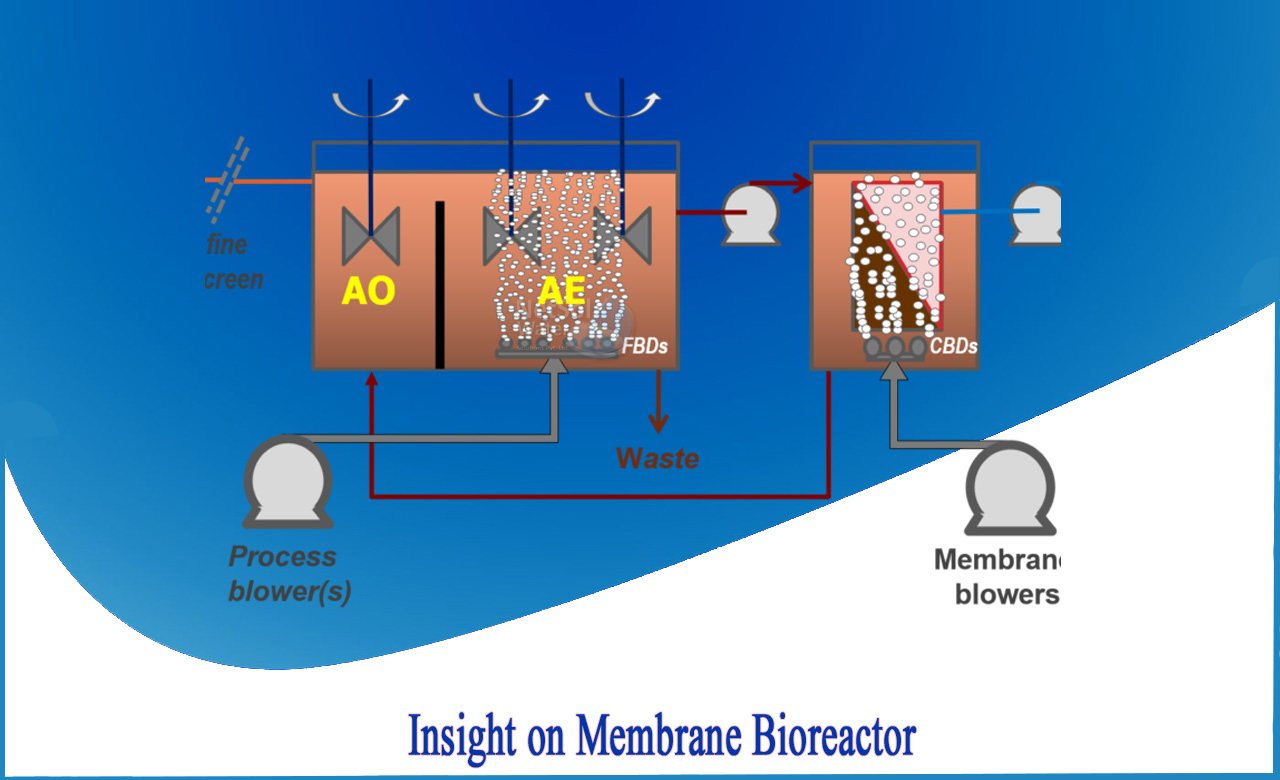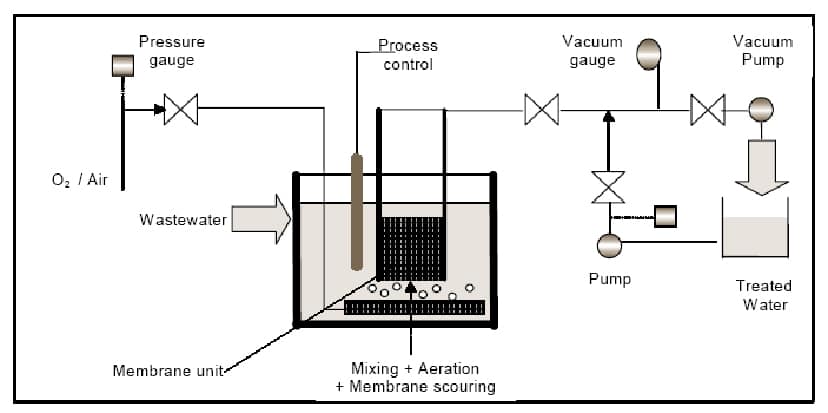How Membrane Bioreactor Technology Is Revolutionizing Wastewater Treatment
How Membrane Bioreactor Technology Is Revolutionizing Wastewater Treatment
Blog Article
The Benefits of Membrane Layer Bioreactors in Lasting Wastewater Monitoring
Membrane layer bioreactors (MBRs) represent a pivotal innovation in lasting wastewater administration, efficiently merging organic treatment with advanced membrane purification innovation. As the demand for lasting options increases, checking out the multifaceted advantages of MBRs may reveal unanticipated ramifications for the future of wastewater therapy systems.
Review of Membrane Bioreactors
Membrane layer bioreactors (MBRs) represent a substantial development in wastewater therapy modern technology, integrating biological degradation with membrane layer filtering to enhance the performance of the treatment process. This cutting-edge system incorporates the benefits of standard activated sludge procedures with membrane layer technology, permitting improved solid-liquid separation. MBRs make use of semi-permeable membranes to different cured water from biomass, leading to high-quality effluent that can be reused or securely released into the setting.
The operational layout of MBRs commonly involves a bioreactor where bacteria damage down organic issue, complied with by a membrane layer unit that filters the blended liquor. This arrangement not only reduces the impact of the therapy center but also enables greater biomass focus and lowered hydraulic retention times. Additionally, MBRs can dealing with a bigger range of contaminants, including nutrients and virus, making them ideal for different applications, from municipal wastewater treatment to industrial effluent processing.
The combination of MBRs right into wastewater monitoring systems is indicative of a growing trend in the direction of sustainable and reliable techniques in ecological design. Their capacity to produce top quality effluent while reducing space requirements positions MBR innovation as an essential player in modern wastewater therapy services.
Improved Effluent High Quality

The membrane purification procedure acts as a physical obstacle, allowing the retention of microorganisms and particle matter, which adds to a clearer and cleaner effluent (Membrane Bioreactor). MBRs operate at greater biomass concentrations than traditional activated sludge systems, advertising a lot more efficient biodegradation of pollutants. This brings about a reduction in biochemical oxygen need (BODY) and total suspended solids (TSS) degrees in the final effluent
Furthermore, MBRs demonstrate exceptional performance in treating difficult wastewater make-ups, such as industrial effluents and wastewater with high nutrient lots. Consequently, the effluent created is frequently of greater quality, enabling even more adaptable disposal options and lowered environmental effect. Inevitably, the enhanced effluent quality attained through MBR innovation emphasizes its crucial duty in advancing lasting wastewater monitoring practices.
Water Reuse Opportunities
The top notch effluent created by membrane layer bioreactors (MBRs) opens up considerable possibilities for water reuse in numerous applications. MBRs successfully remove contaminants, including virus, put on hold solids, and raw material, causing treated water that meets or surpasses regulative requirements for reuse. This top quality allows for the this implementation of water recycling efforts throughout diverse markets.
One famous application remains in farming, where dealt with wastewater can be utilized for irrigation, promoting sustainable farming methods while saving fresh water resources. Additionally, MBR-treated effluent can be used for industrial processes such as cooling, cleaning, and as a process water source, considerably decreasing the need for safe and clean water in these procedures.
In city settings, MBRs assist in the usage of reclaimed water for landscape irrigation, toilet flushing, and various other non-potable usages, adding to the total resilience of water supply systems. Furthermore, the assimilation of MBR modern technology in decentralized systems help in managing localized water needs, specifically in water-scarce regions.
Reduced Ecological Effect
Just how can the adoption of membrane bioreactors (MBRs) add to a lowered my review here ecological effect in wastewater management? MBRs considerably improve the treatment performance of wastewater while lessening ecological disturbances. By integrating organic treatment procedures with membrane filtration, MBRs efficiently eliminate a variety of toxins, including raw material, nutrients, and pathogens. This innovative purification leads to higher-quality effluent, which is critical for safeguarding marine environments and decreasing the burden on natural water bodies.
Additionally, MBRs run at lower hydraulic retention times compared to standard systems, resulting in smaller therapy plant impacts. This portable design lowers land use, therefore maintaining natural environments and biodiversity. The procedure also produces less sludge than typical methods, reducing disposal obstacles and lowering greenhouse gas emissions related to sludge administration.
Furthermore, MBRs promote the recovery of valuable resources, such as water and nutrients, contributing to a circular economic climate. By making it possible for water reuse for watering or commercial processes, MBRs assist relieve freshwater scarcity, thus promoting sustainable water utilize techniques. Inevitably, the fostering of MBR technology represents a considerable stride in the direction of decreasing the ecological impact of wastewater management systems.
Economic Advantages of MBRs

In addition, MBRs assist in the manufacturing of top notch effluent, which can be recycled for different applications, such as agricultural irrigation and commercial procedures - Membrane Bioreactor. This reuse capacity can dramatically reduce water procurement costs, giving an economic reward for markets facing stringent water regulations
The compact design of MBR systems additionally causes minimized land demands, which is particularly important in metropolitan areas where actual estate is expensive. By reducing space, industries and districts can reduce land acquisition and upkeep expenses.
Moreover, MBRs usually need less regular maintenance and have a longer life-span than typical systems, better contributing to set you back savings. In recap, the economic advantages of MBRs-- varying from minimized operational expenses to land savings and effluent reuse-- make them an engaging option for sustainable wastewater monitoring, providing both prompt and long-term financial advantages.
Final Thought
Additionally, MBRs contribute to decreased environmental impacts through compact styles and reduced sludge generation. Economic benefits additionally improve their feasibility, making MBRs an encouraging option for addressing the challenges of wastewater treatment and promoting lasting source administration.
Membrane layer bioreactors (MBRs) stand for a crucial innovation in lasting wastewater administration, efficiently merging organic treatment with sophisticated membrane purification modern technology.Membrane layer bioreactors (MBRs) stand for a considerable development in wastewater treatment modern technology, incorporating biological degradation with membrane purification to boost the performance of the therapy process.Attaining improved effluent quality is one of the most substantial benefits of using membrane bioreactors (MBRs) in wastewater treatment.Additionally, MBRs show outstanding performance in dealing with tough wastewater structures, such as industrial effluents and wastewater with high nutrient lots.Integrating membrane layer bioreactors (MBRs) right into wastewater administration not only lowers ecological impact however also provides considerable financial advantages.
Report this page